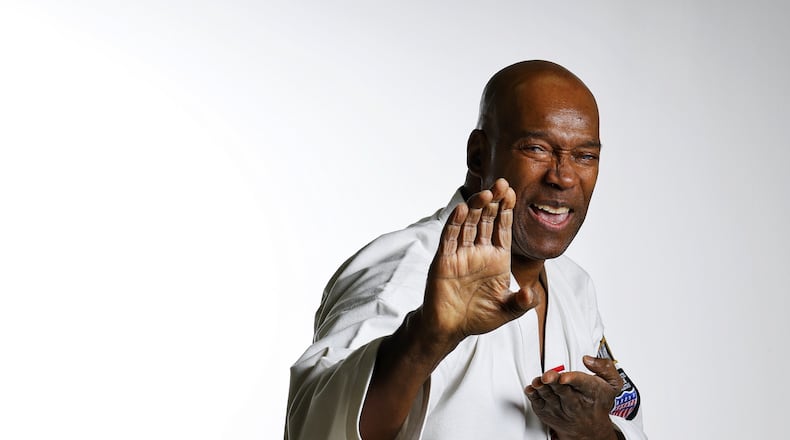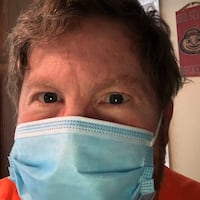“There’s no ifs, ands or buts about that,” Harris said. “You lose some, you win some, but in your amateur stage, you don’t keep keep count of those.”
A 1969 graduate of Garfield High School, Harris was the U.S. Karate Association national champion in 1975 while still studying at Miami University.
He was the National Black Belt Karate Association world champion in 1977 after a second-round knockout of George Baker. And Harris won his second world title at Dayton’s Hara Arena when he knocked out Herman “The Wizard” Mitchell of Cleveland, in another NBBKA-sanctioned fight.
“My claim to fame is I did it with no broken bones,” Harris said. “Would I want to try that again? The answer is no. No-no-no.”
These days, most of Harris’ fighting is on behalf of Hamilton’s impoverished Second Ward and Fourth Ward neighborhoods, also known as Riverview and Jefferson, as leader of the South East Civic Association.
Rough and tumble youth
Harris grew up in the Second Ward, an athletic kid who set an Ohio record for seventh-grade pole vaulters while at Roosevelt Junior High. He later played football in high school. But before that, he took up karate in self defense from his mother, Mary Harris.
“My mother, if you got into a fight on the streets, when you got home, you got a whoopin’,” Harris said. “I just got tired of being whooped twice.”
He started learning karate around age 11, training first at the Booker T. Washington Community Center, where he later would serve as interim director during the 1990s. The BTW Center was created in his neighborhood in 1949 because at the time, he said, African-Americans couldn’t buy memberships to the YMCA because of their race. It now is operated in cooperation with the YMCA.
After he was ranked in the top 10 among karate fighters, he adopted the fighting name of Bob “Moo Duk Kwan” Harris, in honor of the Korean martial arts-style training he received.
In 1978, he attended the Muhammad Ali Training Camp in Deer Lake, Pa., for two months, and left in the best shape of his life. But the best training he received while there were during meal conversations with the world boxing champion.
Credit: Nick Graham
Credit: Nick Graham
Proud of a faded neighborhood
Harris, a father of six adults who owns Bob Harris Photography Studios and Bob Harris Karate Studios, is proud to have grown up in the Second Ward, where he still lives. It’s not as vibrant as it used to be, he laments.
There used to have a drug store and three grocery stores, a dry cleaners and a variety of businesses.
“You had what you needed for a community to survive,” he said. “The problem I see now is that 90 percent of the money goes out of the community and it doesn’t come back in. There are no jobs to speak of in the community, where you walk out your door, go to work and stay in your community. That’s lacking.”
Harris has led SECA since 1995, and says a key to lifting both neighborhoods is pushing education and trade skills.
He believes with the immense Spooky Nook Sports Champion Mill indoor sports complex to open later this year, the city needs to develop Pershing Avenue and Central Avenue: “They need all the help they can get. But the people living in the Second Ward, there’s very people who can afford to open a business.”
“The other part is you have to find recreation for the kids, the teenagers and the adults,” he said.
Credit: Nick Graham
Credit: Nick Graham
He’s concerned about possible gentrification of the Second Ward, with hotels and businesses moving in. He sees as a prime area for development because it’s near the Great Miami River.
Harris successfully pressed city officials to work on a study with Miami University planning students for development of the Second Ward. He was pleased with that study, but said those efforts have been stymied by the COVID-19 pandemic.
Bike rides through the area
Harris often rides his bicycle through the neighborhood at night, looking for things that need improvement. When a street light burns out, he writes down the utility pole number and reports it to the city. He sometimes rides with Mayor Pat Moeller and other city leaders.
“If you want to learn about some Hamilton history, ride bikes with Bob Harris,” Moeller said recently. “I have learned from Bob and I believe he has learned from me. We have sparred a few times on issues, but it is because we both care a lot about Hamilton.”
Moeller said Harris is “a Hall of Famer in the world of karate and is a Hall of Famer in improving Hamilton.”
He belongs to several such halls, including the National Martial Arts Hall of Fame, NBBKA Hall of Fame and the All Stars Karate National Hall of Fame.
He also was lead singer at various times in the groups The Cadets, The Elgins, Footprints in the Sand and The Determinations. He also provided security through the years to such bands as Blue Oyster Cult, Earth Wind and Fire, and Ohio Players.
He’s writing an autobiography, and has finished it through age 10.
Hopes and concerns
Harris says his biggest SECA accomplishments have been successfully advocating for $1.9 million improvements to 2nd Street, including improved curbs and gutters. He also lists the citywide cleanup, which began with cleanups in the Second- and Fourth Ward cleanups in the mid-1990s.
It’s important “to make the community user-friendly and to change the image of the community,” he said, of a journey he said still needs improvement. “To do that, and attract businesses back to the community, I felt like we had to clean the community up and make the community a safe place to come.”
Here are some things Harris sees as hopes and obstacles for the future of the Second and Fourth Wards, and the city:
- Improved minority hiring: Harris and others pushed for a tougher Hamilton Diversity & Inclusion commission, but was displeased with what the city created. “The city in 1952 had 52 African-Americans working for the city,” he said. “Today, they don’t have that, and they haven’t had that. When it comes to inclusion, we don’t have Black people sitting on that board, this board. Some numbers have increased, but my pitch is for more African-Americans to get involved” on boards.
- “The barriers, they are not broken down. We still have to address school issues. We have to understand why more Black kids are being expelled from school,” he said.
- “I don’t see the Second Ward moving in terms of economic development and having any growth unless we can get away from the barbershops and the beauty salons,” he said. “We have to have grocery stores. We’ve got to have stores that are necessity stores.”
- He appreciates that Greater Hamilton Chamber of Commerce president and CEO Dan Bates is working to help minorities in Hamilton creates business plans and meet with bankers to finance their ideas for new enterprises.
- He tells fellow neighborhood residents: “You want a nice neighborhood? You want a safe neighborhood? Then you’ve got to be a part of making it happen.” He wishes the city would hold people more accountable for taking care of their properties.
- “Since I was born and raised in Hamilton, I’m rah-rah Hamilton, but it has to be for the entire city, and those places that need more attention, I’m rah-rah for. Let’s get it done.”
About the Author



